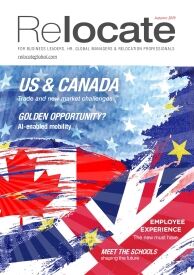Flying the flag for LGBTQ+ expatriates
Global mobility, perhaps more than most other HR domains, is at the forefront of pioneering ways to best manage assignments for people who identify as LGBTQ+.

Keeping pace with change
Despite significant progress in recent decades across much of the world, there are still 72 countries where homosexuality is regarded as a crime. Included in this number are Russia, UAE, Pakistan and Malaysia. For a larger number of countries, gay rights are minimal if homosexuality is not a criminal act.Worryingly, findings from a Mercer Pulse survey show that almost two-thirds (61%) of organisations are not aware of the local and cultural environments or legal conditions for LGBT employees in all of the locations in which they operate. A further 73% of cultural training offered to internationally mobile employees excludes information on LGBT considerations.Related articles:
- LGBT+ Network strives for inclusive and diverse workplaces
- Relocate Awards Winner: Excellence in Inclusion & Diversity
- This Is Us Conference 2019
These figures echo an earlier Mercer study cited by Weichert in its white paper and round out the picture that LGBTQ+ assignees are being underserved by employers. This study found that 56% of respondents to a 2016 Pulse survey cited compliance issues as the main barrier to mobility for people who identify as LGBT, highlighting the additional challenges around tax and immigration. Again, this was exacerbated by 64% of managers not being offered training around the issues.
Employee experience supporting inclusion
Weichert’s 2019 white paper, Diversity Matters: Best Practices and Benefits for LGBTQ Assignees – discussed during the CERC’s panel session ‘Meeting the Evolving Needs ofToday’s Expat: Incorporating Diversity & Inclusion Policies in Global Mobility Planning’ – offered insights into what companies can and are doing to ease pathways to successful assignments.A key aspect is how the shift to employee experience and its more flexible, people-focused assignment packages are dovetailing better with LGBTQ+ assignee needs. For example, in some companies, relocation benefits are being offered to partners who are not married, including same-sex couples.However, the challenge arises around support mechanisms, observes Weichert. These often focus on traditional assignee profiles and do not encompass the type of advice or support a lesbian, gay or transgender assignee might find most useful.Weichert therefore advises, "Organisations should ensure that any internal or external relocation managers, as well as any relocation- related service providers, are well-trained about the nuances and unique challenges that can accompany different family structures, and should know which resources can best help LGBTQ couples to minimise stress, and ease the transition process as much as possible."Download our free LGBTQ & Diversity Factsheet
Subscribe to Relocate Extra, our monthly newsletter, to get all the latest international assignments and global mobility news.Relocate’s new Global Mobility Toolkit provides free information, practical advice and support for HR, global mobility managers and global teams operating overseas. Access hundreds of global services and suppliers in our Online Directory
Access hundreds of global services and suppliers in our Online Directory ©2019. This article first appeared in the Autumn 2019 edition of Relocate magazine, published by Profile Locations, Spray Hill, Hastings Road, Lamberhurst, Kent TN3 8JB. All rights reserved. This publication (or any part thereof) may not be reproduced in any form without the prior written permission of Profile Locations. Profile Locations accepts no liability for the accuracy of the contents or any opinions expressed herein.
©2019. This article first appeared in the Autumn 2019 edition of Relocate magazine, published by Profile Locations, Spray Hill, Hastings Road, Lamberhurst, Kent TN3 8JB. All rights reserved. This publication (or any part thereof) may not be reproduced in any form without the prior written permission of Profile Locations. Profile Locations accepts no liability for the accuracy of the contents or any opinions expressed herein.









































